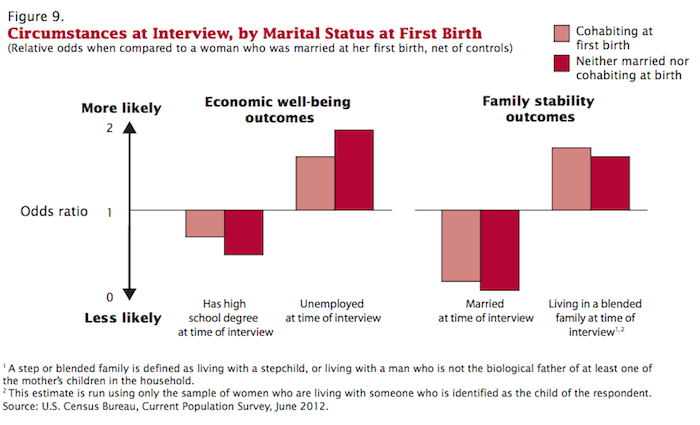Highlights
Does becoming (or growing up with) a single parent put people at a disadvantage, or do prior circumstances and background characteristics cause both single parenthood and the negative outcomes it's associated with? Prior research suggests that the short answer to that question is "both," but analyses in a new Census report underline that even after accounting for background factors to the extent possible, having one's first child outside of marriage is associated for women with worse economic well-being and greater instability down the road—with negative implications for their kids.
Controlling for "the mother’s race, Hispanic origin, nativity, age at first birth, years since first birth, and number of children ever born," researchers ran four logistic regression models to examine the relationship between a woman's relationship status at the time of her first birth and that woman's educational attainment, employment, marital status, and family complexity at the time of the survey in 2012. Their findings are depicted in the table below.

As the figure illustrates, women who were not married at the time of their first birth are less likely to have earned their high school degree that women who were married. The researchers note that as other sources show, women with lower educational attainment are more likely to give birth outside of marriage in the first place, but their findings still "suggest that, even over the course of many years, women with a nonmarital first birth do not catch up to their counterparts whose first birth was in marriage." A second finding, probably related to some extent with this gap in educational attainment: Women who were unmarried at the time they first gave birth are less likely to be employed later in life.
Third, women are less likely to be married if their first birth took place outside of marriage. The Census report does not delve into their full relationship histories; however, other research on nonmarital childbearing shows this fact may be due both to these women being less likely to ever marry and more likely to divorce if they do marry.
Finally, among the women sharing a household with a child at the time of the survey, those who first gave birth while unmarried were more likely to live in a blended family (that is, "to have a stepchild in the home or to have a spouse or partner who is a stepfather to at least one of their children"). As the researchers conclude, their findings "suggest that women with nonmarital first births may face continued disadvantage over their lives compared with women with marital first births." Obviously, women's disadvantages have negative repercussions for their children; both poverty and instability make it harder for children to flourish physically, mentally, and academically.
Unfortunately, the dynamics detailed above are set to affect a growing number of women and children (and men). According to the same Census report, seventy percent of women who gave birth for the first time between 1990 and 1994 were married at the time of the birth, versus just 55 percent of women whose first birth took place in 2005 or later.












